Investigating Service Quality Issues in Chinese Luxury Hotels
VerifiedAdded on 2022/10/18
|25
|5788
|23
Report
AI Summary
This report delves into the service quality challenges faced by luxury hotels in China, focusing on factors that hinder guest satisfaction and competitiveness. The research investigates the impact of the rapid expansion of the hotel industry, the demand for skilled talent, and the influence of management guidelines on service delivery. The study examines how service quality is defined and explores the role of management in implementing tools to optimize service standards. The report includes a literature review on service quality and the growth of the hotel industry in China, as well as a methodology section outlining the research approach, data collection methods, and ethical considerations. The research questions address the definition of service quality, the impact of industry expansion, the factors behind service quality issues, the influence of talent demand, the role of management, and the key changes needed to improve service quality. The report aims to analyze and evaluate service quality issues in the context of the luxury hotel industry in China, considering the country's economic transition and the demand for tourism.
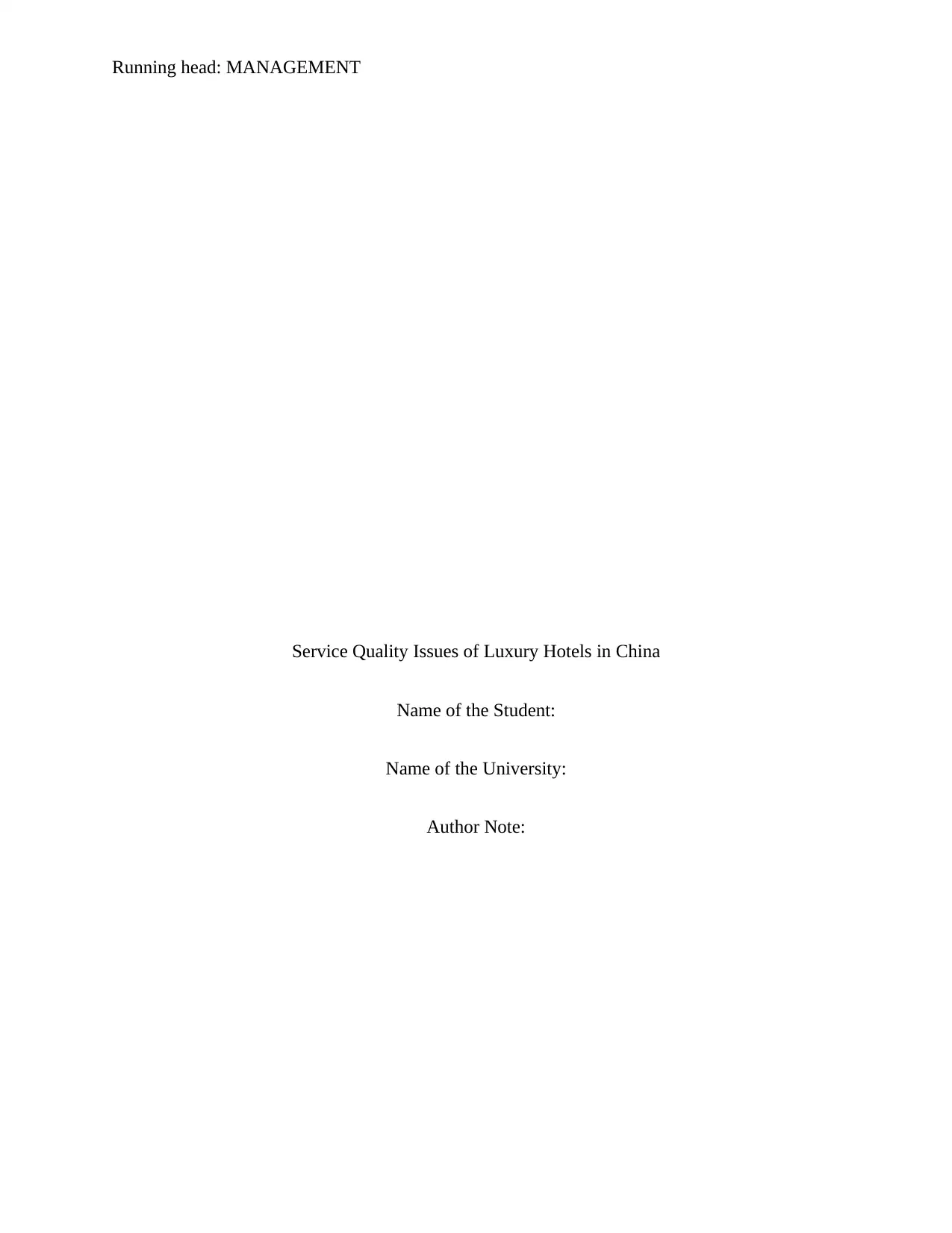
Running head: MANAGEMENT
Service Quality Issues of Luxury Hotels in China
Name of the Student:
Name of the University:
Author Note:
Service Quality Issues of Luxury Hotels in China
Name of the Student:
Name of the University:
Author Note:
Paraphrase This Document
Need a fresh take? Get an instant paraphrase of this document with our AI Paraphraser
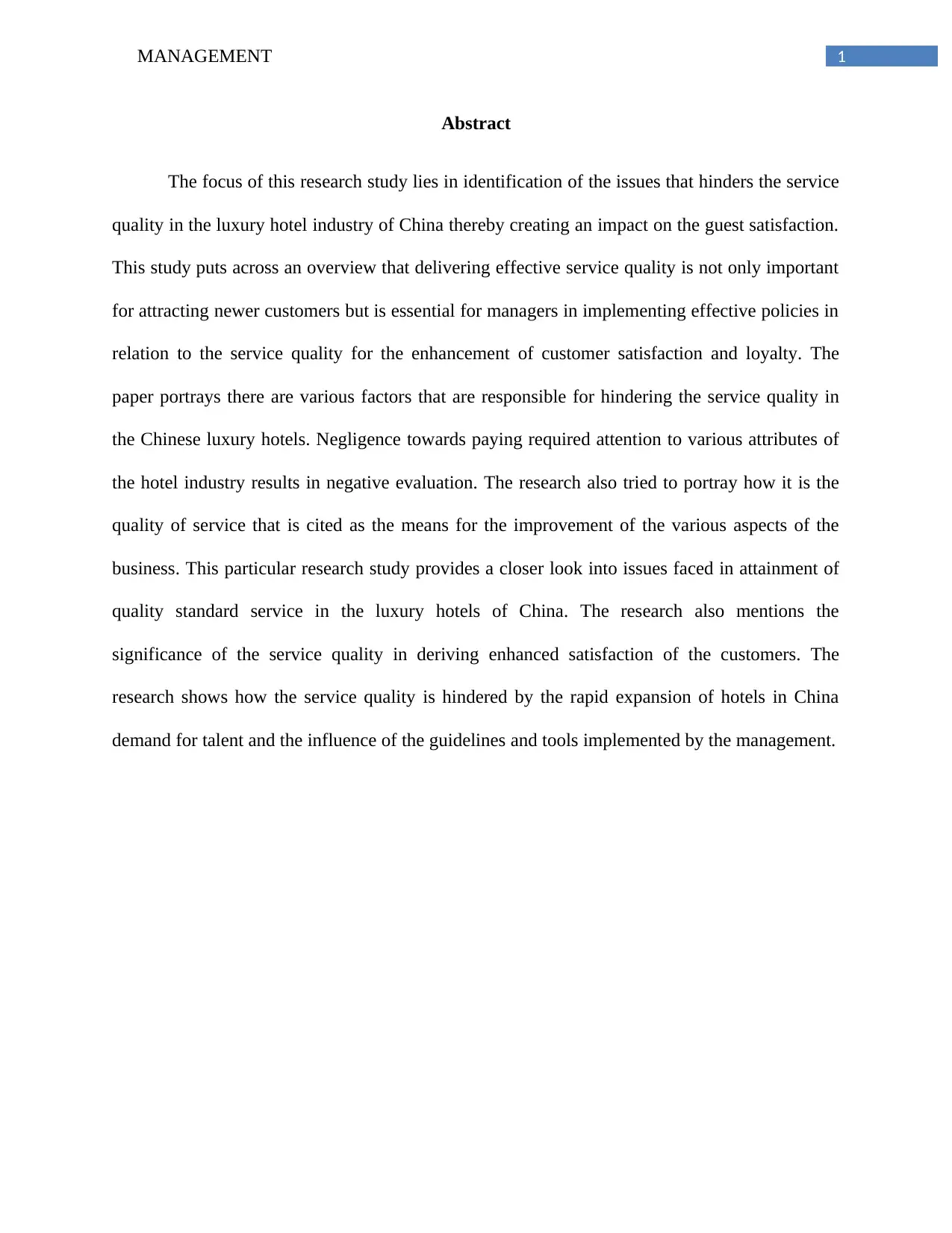
1MANAGEMENT
Abstract
The focus of this research study lies in identification of the issues that hinders the service
quality in the luxury hotel industry of China thereby creating an impact on the guest satisfaction.
This study puts across an overview that delivering effective service quality is not only important
for attracting newer customers but is essential for managers in implementing effective policies in
relation to the service quality for the enhancement of customer satisfaction and loyalty. The
paper portrays there are various factors that are responsible for hindering the service quality in
the Chinese luxury hotels. Negligence towards paying required attention to various attributes of
the hotel industry results in negative evaluation. The research also tried to portray how it is the
quality of service that is cited as the means for the improvement of the various aspects of the
business. This particular research study provides a closer look into issues faced in attainment of
quality standard service in the luxury hotels of China. The research also mentions the
significance of the service quality in deriving enhanced satisfaction of the customers. The
research shows how the service quality is hindered by the rapid expansion of hotels in China
demand for talent and the influence of the guidelines and tools implemented by the management.
Abstract
The focus of this research study lies in identification of the issues that hinders the service
quality in the luxury hotel industry of China thereby creating an impact on the guest satisfaction.
This study puts across an overview that delivering effective service quality is not only important
for attracting newer customers but is essential for managers in implementing effective policies in
relation to the service quality for the enhancement of customer satisfaction and loyalty. The
paper portrays there are various factors that are responsible for hindering the service quality in
the Chinese luxury hotels. Negligence towards paying required attention to various attributes of
the hotel industry results in negative evaluation. The research also tried to portray how it is the
quality of service that is cited as the means for the improvement of the various aspects of the
business. This particular research study provides a closer look into issues faced in attainment of
quality standard service in the luxury hotels of China. The research also mentions the
significance of the service quality in deriving enhanced satisfaction of the customers. The
research shows how the service quality is hindered by the rapid expansion of hotels in China
demand for talent and the influence of the guidelines and tools implemented by the management.
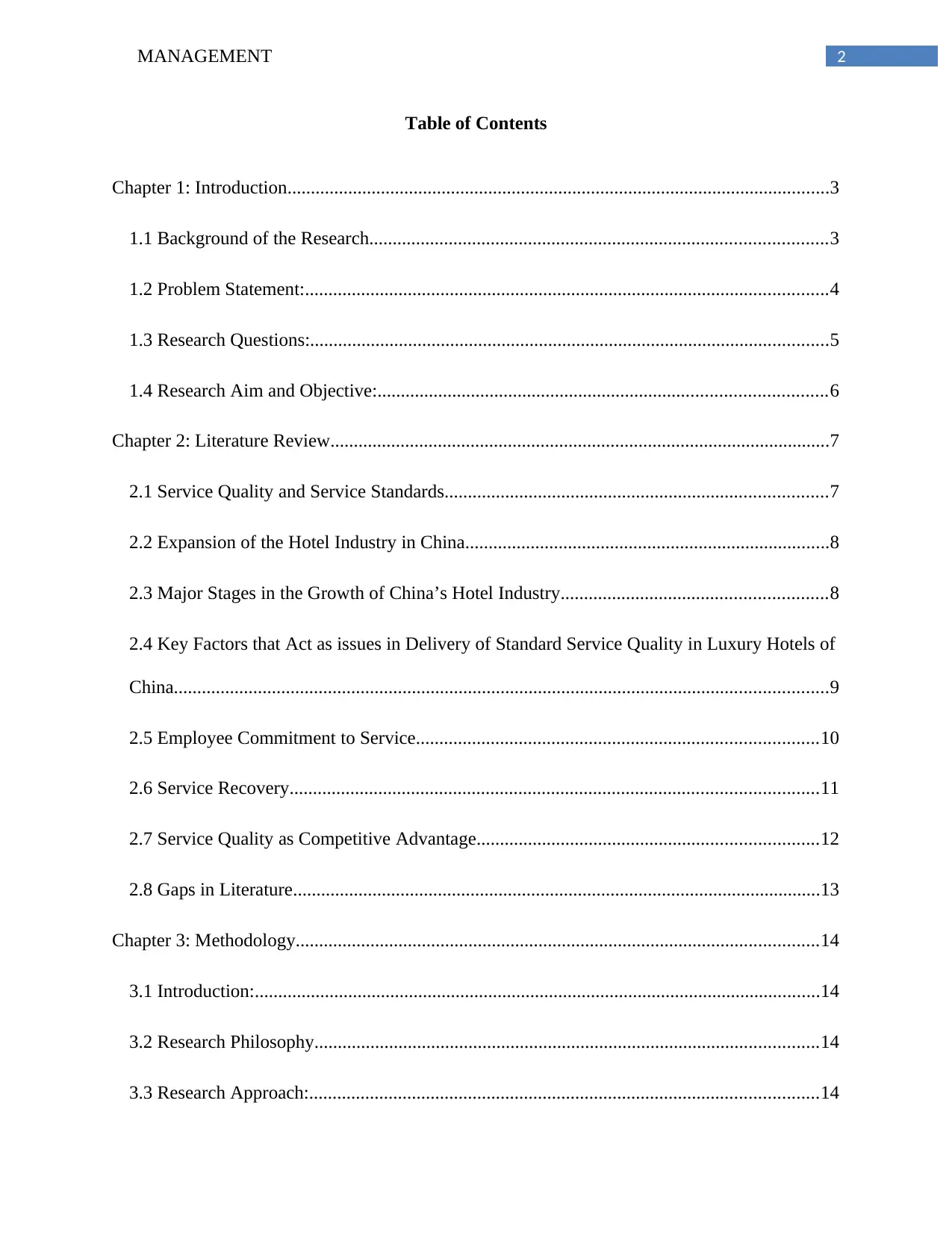
2MANAGEMENT
Table of Contents
Chapter 1: Introduction....................................................................................................................3
1.1 Background of the Research..................................................................................................3
1.2 Problem Statement:................................................................................................................4
1.3 Research Questions:...............................................................................................................5
1.4 Research Aim and Objective:................................................................................................6
Chapter 2: Literature Review...........................................................................................................7
2.1 Service Quality and Service Standards..................................................................................7
2.2 Expansion of the Hotel Industry in China..............................................................................8
2.3 Major Stages in the Growth of China’s Hotel Industry.........................................................8
2.4 Key Factors that Act as issues in Delivery of Standard Service Quality in Luxury Hotels of
China............................................................................................................................................9
2.5 Employee Commitment to Service......................................................................................10
2.6 Service Recovery.................................................................................................................11
2.7 Service Quality as Competitive Advantage.........................................................................12
2.8 Gaps in Literature.................................................................................................................13
Chapter 3: Methodology................................................................................................................14
3.1 Introduction:.........................................................................................................................14
3.2 Research Philosophy............................................................................................................14
3.3 Research Approach:.............................................................................................................14
Table of Contents
Chapter 1: Introduction....................................................................................................................3
1.1 Background of the Research..................................................................................................3
1.2 Problem Statement:................................................................................................................4
1.3 Research Questions:...............................................................................................................5
1.4 Research Aim and Objective:................................................................................................6
Chapter 2: Literature Review...........................................................................................................7
2.1 Service Quality and Service Standards..................................................................................7
2.2 Expansion of the Hotel Industry in China..............................................................................8
2.3 Major Stages in the Growth of China’s Hotel Industry.........................................................8
2.4 Key Factors that Act as issues in Delivery of Standard Service Quality in Luxury Hotels of
China............................................................................................................................................9
2.5 Employee Commitment to Service......................................................................................10
2.6 Service Recovery.................................................................................................................11
2.7 Service Quality as Competitive Advantage.........................................................................12
2.8 Gaps in Literature.................................................................................................................13
Chapter 3: Methodology................................................................................................................14
3.1 Introduction:.........................................................................................................................14
3.2 Research Philosophy............................................................................................................14
3.3 Research Approach:.............................................................................................................14
⊘ This is a preview!⊘
Do you want full access?
Subscribe today to unlock all pages.

Trusted by 1+ million students worldwide
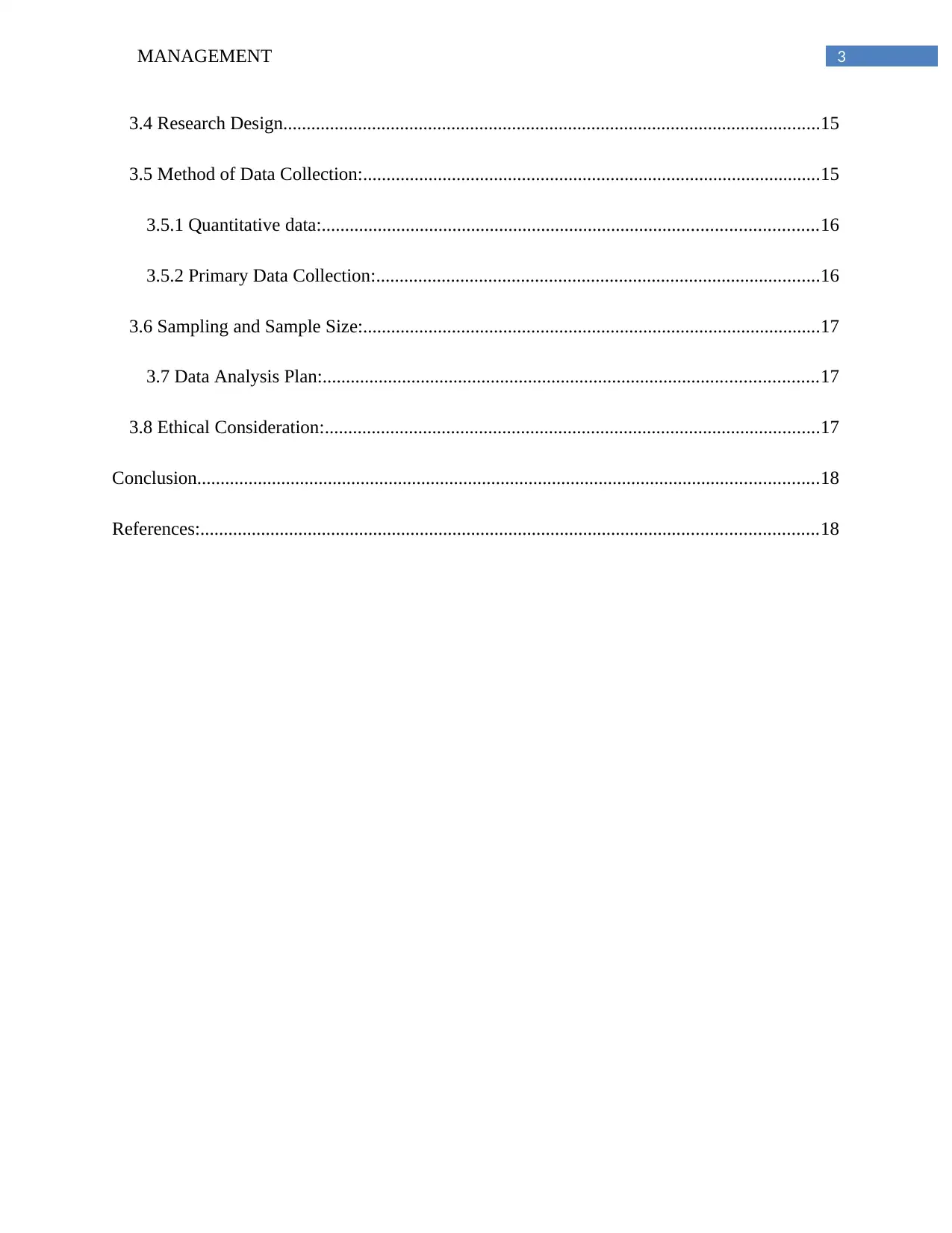
3MANAGEMENT
3.4 Research Design...................................................................................................................15
3.5 Method of Data Collection:..................................................................................................15
3.5.1 Quantitative data:..........................................................................................................16
3.5.2 Primary Data Collection:...............................................................................................16
3.6 Sampling and Sample Size:..................................................................................................17
3.7 Data Analysis Plan:..........................................................................................................17
3.8 Ethical Consideration:..........................................................................................................17
Conclusion.....................................................................................................................................18
References:....................................................................................................................................18
3.4 Research Design...................................................................................................................15
3.5 Method of Data Collection:..................................................................................................15
3.5.1 Quantitative data:..........................................................................................................16
3.5.2 Primary Data Collection:...............................................................................................16
3.6 Sampling and Sample Size:..................................................................................................17
3.7 Data Analysis Plan:..........................................................................................................17
3.8 Ethical Consideration:..........................................................................................................17
Conclusion.....................................................................................................................................18
References:....................................................................................................................................18
Paraphrase This Document
Need a fresh take? Get an instant paraphrase of this document with our AI Paraphraser
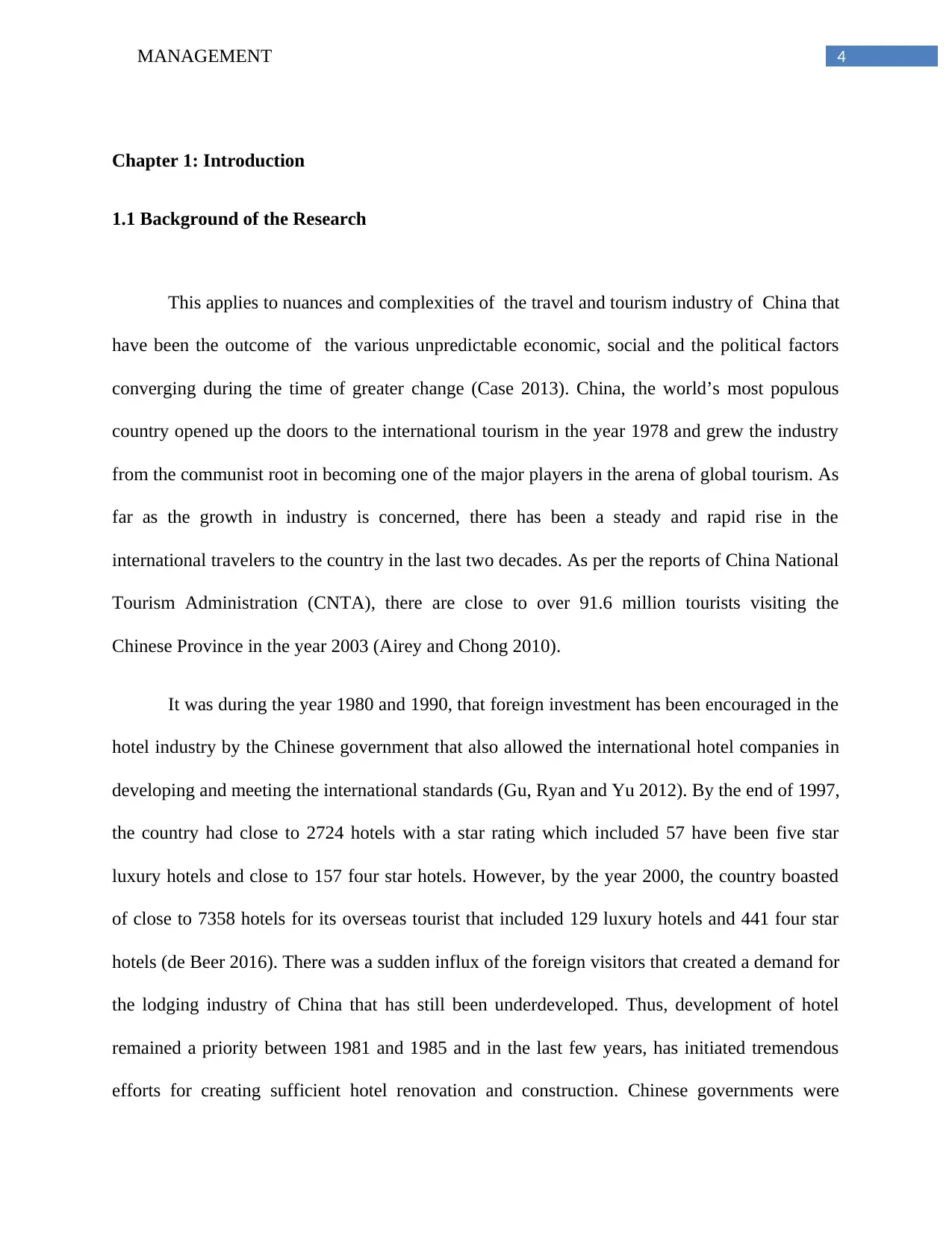
4MANAGEMENT
Chapter 1: Introduction
1.1 Background of the Research
This applies to nuances and complexities of the travel and tourism industry of China that
have been the outcome of the various unpredictable economic, social and the political factors
converging during the time of greater change (Case 2013). China, the world’s most populous
country opened up the doors to the international tourism in the year 1978 and grew the industry
from the communist root in becoming one of the major players in the arena of global tourism. As
far as the growth in industry is concerned, there has been a steady and rapid rise in the
international travelers to the country in the last two decades. As per the reports of China National
Tourism Administration (CNTA), there are close to over 91.6 million tourists visiting the
Chinese Province in the year 2003 (Airey and Chong 2010).
It was during the year 1980 and 1990, that foreign investment has been encouraged in the
hotel industry by the Chinese government that also allowed the international hotel companies in
developing and meeting the international standards (Gu, Ryan and Yu 2012). By the end of 1997,
the country had close to 2724 hotels with a star rating which included 57 have been five star
luxury hotels and close to 157 four star hotels. However, by the year 2000, the country boasted
of close to 7358 hotels for its overseas tourist that included 129 luxury hotels and 441 four star
hotels (de Beer 2016). There was a sudden influx of the foreign visitors that created a demand for
the lodging industry of China that has still been underdeveloped. Thus, development of hotel
remained a priority between 1981 and 1985 and in the last few years, has initiated tremendous
efforts for creating sufficient hotel renovation and construction. Chinese governments were
Chapter 1: Introduction
1.1 Background of the Research
This applies to nuances and complexities of the travel and tourism industry of China that
have been the outcome of the various unpredictable economic, social and the political factors
converging during the time of greater change (Case 2013). China, the world’s most populous
country opened up the doors to the international tourism in the year 1978 and grew the industry
from the communist root in becoming one of the major players in the arena of global tourism. As
far as the growth in industry is concerned, there has been a steady and rapid rise in the
international travelers to the country in the last two decades. As per the reports of China National
Tourism Administration (CNTA), there are close to over 91.6 million tourists visiting the
Chinese Province in the year 2003 (Airey and Chong 2010).
It was during the year 1980 and 1990, that foreign investment has been encouraged in the
hotel industry by the Chinese government that also allowed the international hotel companies in
developing and meeting the international standards (Gu, Ryan and Yu 2012). By the end of 1997,
the country had close to 2724 hotels with a star rating which included 57 have been five star
luxury hotels and close to 157 four star hotels. However, by the year 2000, the country boasted
of close to 7358 hotels for its overseas tourist that included 129 luxury hotels and 441 four star
hotels (de Beer 2016). There was a sudden influx of the foreign visitors that created a demand for
the lodging industry of China that has still been underdeveloped. Thus, development of hotel
remained a priority between 1981 and 1985 and in the last few years, has initiated tremendous
efforts for creating sufficient hotel renovation and construction. Chinese governments were
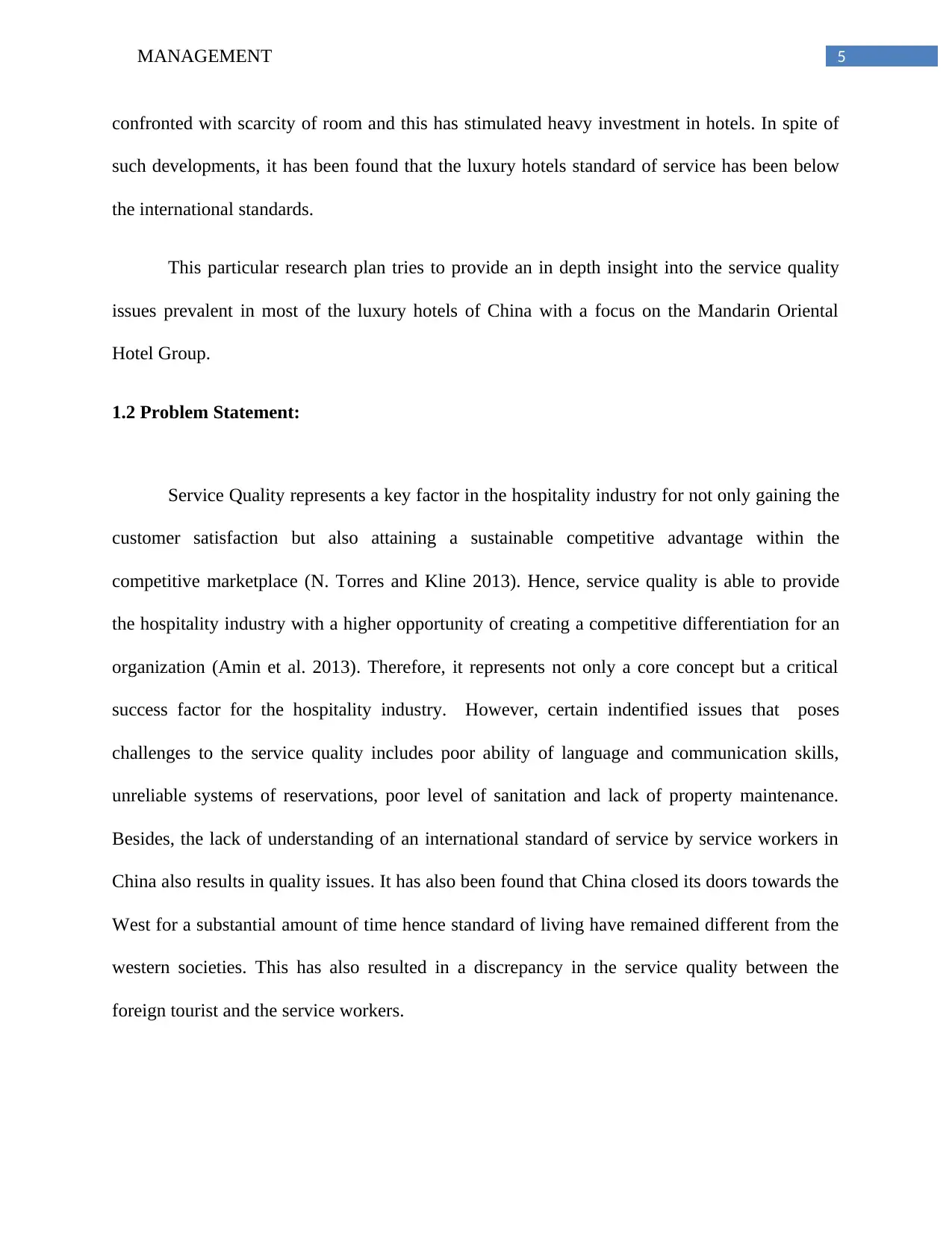
5MANAGEMENT
confronted with scarcity of room and this has stimulated heavy investment in hotels. In spite of
such developments, it has been found that the luxury hotels standard of service has been below
the international standards.
This particular research plan tries to provide an in depth insight into the service quality
issues prevalent in most of the luxury hotels of China with a focus on the Mandarin Oriental
Hotel Group.
1.2 Problem Statement:
Service Quality represents a key factor in the hospitality industry for not only gaining the
customer satisfaction but also attaining a sustainable competitive advantage within the
competitive marketplace (N. Torres and Kline 2013). Hence, service quality is able to provide
the hospitality industry with a higher opportunity of creating a competitive differentiation for an
organization (Amin et al. 2013). Therefore, it represents not only a core concept but a critical
success factor for the hospitality industry. However, certain indentified issues that poses
challenges to the service quality includes poor ability of language and communication skills,
unreliable systems of reservations, poor level of sanitation and lack of property maintenance.
Besides, the lack of understanding of an international standard of service by service workers in
China also results in quality issues. It has also been found that China closed its doors towards the
West for a substantial amount of time hence standard of living have remained different from the
western societies. This has also resulted in a discrepancy in the service quality between the
foreign tourist and the service workers.
confronted with scarcity of room and this has stimulated heavy investment in hotels. In spite of
such developments, it has been found that the luxury hotels standard of service has been below
the international standards.
This particular research plan tries to provide an in depth insight into the service quality
issues prevalent in most of the luxury hotels of China with a focus on the Mandarin Oriental
Hotel Group.
1.2 Problem Statement:
Service Quality represents a key factor in the hospitality industry for not only gaining the
customer satisfaction but also attaining a sustainable competitive advantage within the
competitive marketplace (N. Torres and Kline 2013). Hence, service quality is able to provide
the hospitality industry with a higher opportunity of creating a competitive differentiation for an
organization (Amin et al. 2013). Therefore, it represents not only a core concept but a critical
success factor for the hospitality industry. However, certain indentified issues that poses
challenges to the service quality includes poor ability of language and communication skills,
unreliable systems of reservations, poor level of sanitation and lack of property maintenance.
Besides, the lack of understanding of an international standard of service by service workers in
China also results in quality issues. It has also been found that China closed its doors towards the
West for a substantial amount of time hence standard of living have remained different from the
western societies. This has also resulted in a discrepancy in the service quality between the
foreign tourist and the service workers.
⊘ This is a preview!⊘
Do you want full access?
Subscribe today to unlock all pages.

Trusted by 1+ million students worldwide
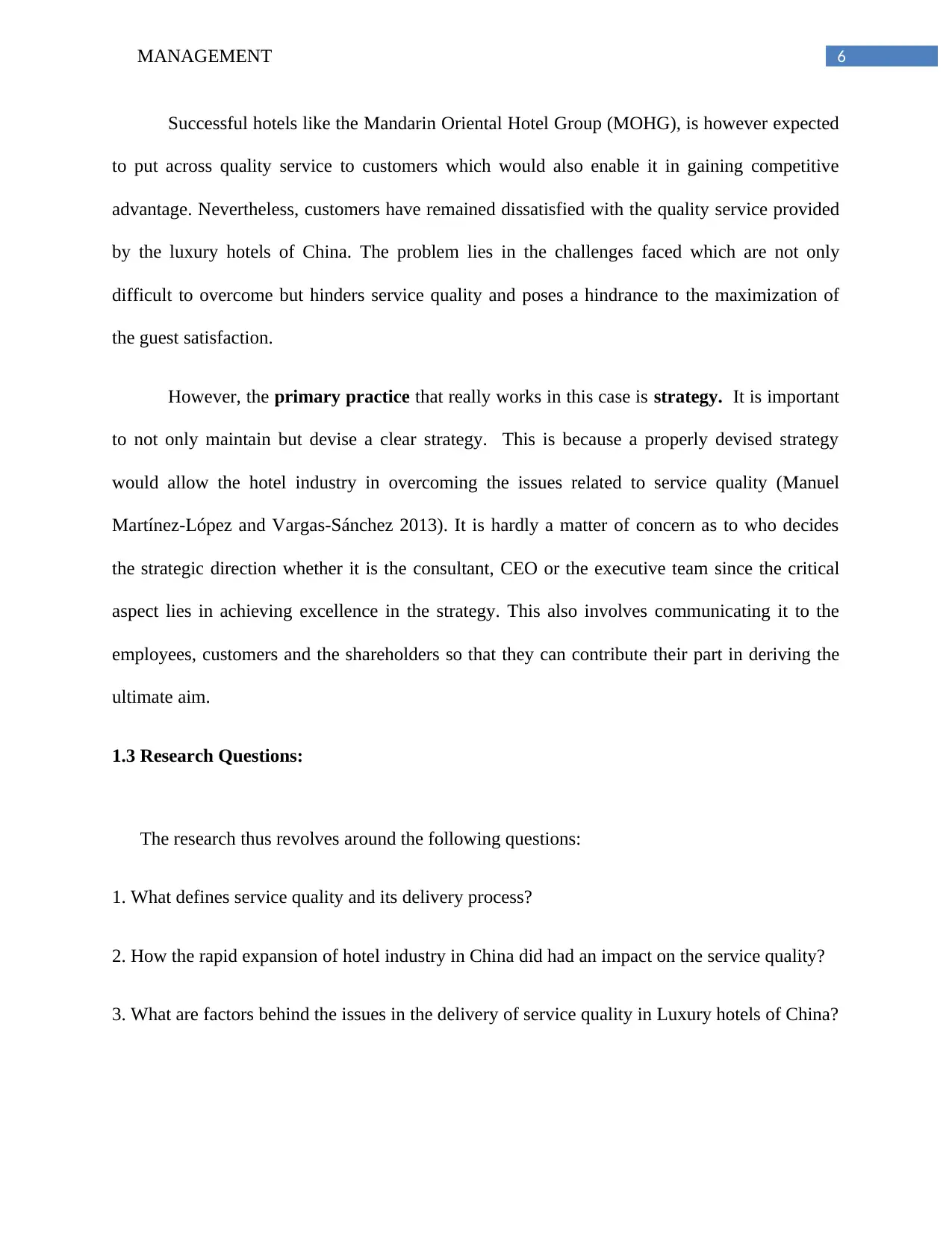
6MANAGEMENT
Successful hotels like the Mandarin Oriental Hotel Group (MOHG), is however expected
to put across quality service to customers which would also enable it in gaining competitive
advantage. Nevertheless, customers have remained dissatisfied with the quality service provided
by the luxury hotels of China. The problem lies in the challenges faced which are not only
difficult to overcome but hinders service quality and poses a hindrance to the maximization of
the guest satisfaction.
However, the primary practice that really works in this case is strategy. It is important
to not only maintain but devise a clear strategy. This is because a properly devised strategy
would allow the hotel industry in overcoming the issues related to service quality (Manuel
Martínez-López and Vargas-Sánchez 2013). It is hardly a matter of concern as to who decides
the strategic direction whether it is the consultant, CEO or the executive team since the critical
aspect lies in achieving excellence in the strategy. This also involves communicating it to the
employees, customers and the shareholders so that they can contribute their part in deriving the
ultimate aim.
1.3 Research Questions:
The research thus revolves around the following questions:
1. What defines service quality and its delivery process?
2. How the rapid expansion of hotel industry in China did had an impact on the service quality?
3. What are factors behind the issues in the delivery of service quality in Luxury hotels of China?
Successful hotels like the Mandarin Oriental Hotel Group (MOHG), is however expected
to put across quality service to customers which would also enable it in gaining competitive
advantage. Nevertheless, customers have remained dissatisfied with the quality service provided
by the luxury hotels of China. The problem lies in the challenges faced which are not only
difficult to overcome but hinders service quality and poses a hindrance to the maximization of
the guest satisfaction.
However, the primary practice that really works in this case is strategy. It is important
to not only maintain but devise a clear strategy. This is because a properly devised strategy
would allow the hotel industry in overcoming the issues related to service quality (Manuel
Martínez-López and Vargas-Sánchez 2013). It is hardly a matter of concern as to who decides
the strategic direction whether it is the consultant, CEO or the executive team since the critical
aspect lies in achieving excellence in the strategy. This also involves communicating it to the
employees, customers and the shareholders so that they can contribute their part in deriving the
ultimate aim.
1.3 Research Questions:
The research thus revolves around the following questions:
1. What defines service quality and its delivery process?
2. How the rapid expansion of hotel industry in China did had an impact on the service quality?
3. What are factors behind the issues in the delivery of service quality in Luxury hotels of China?
Paraphrase This Document
Need a fresh take? Get an instant paraphrase of this document with our AI Paraphraser
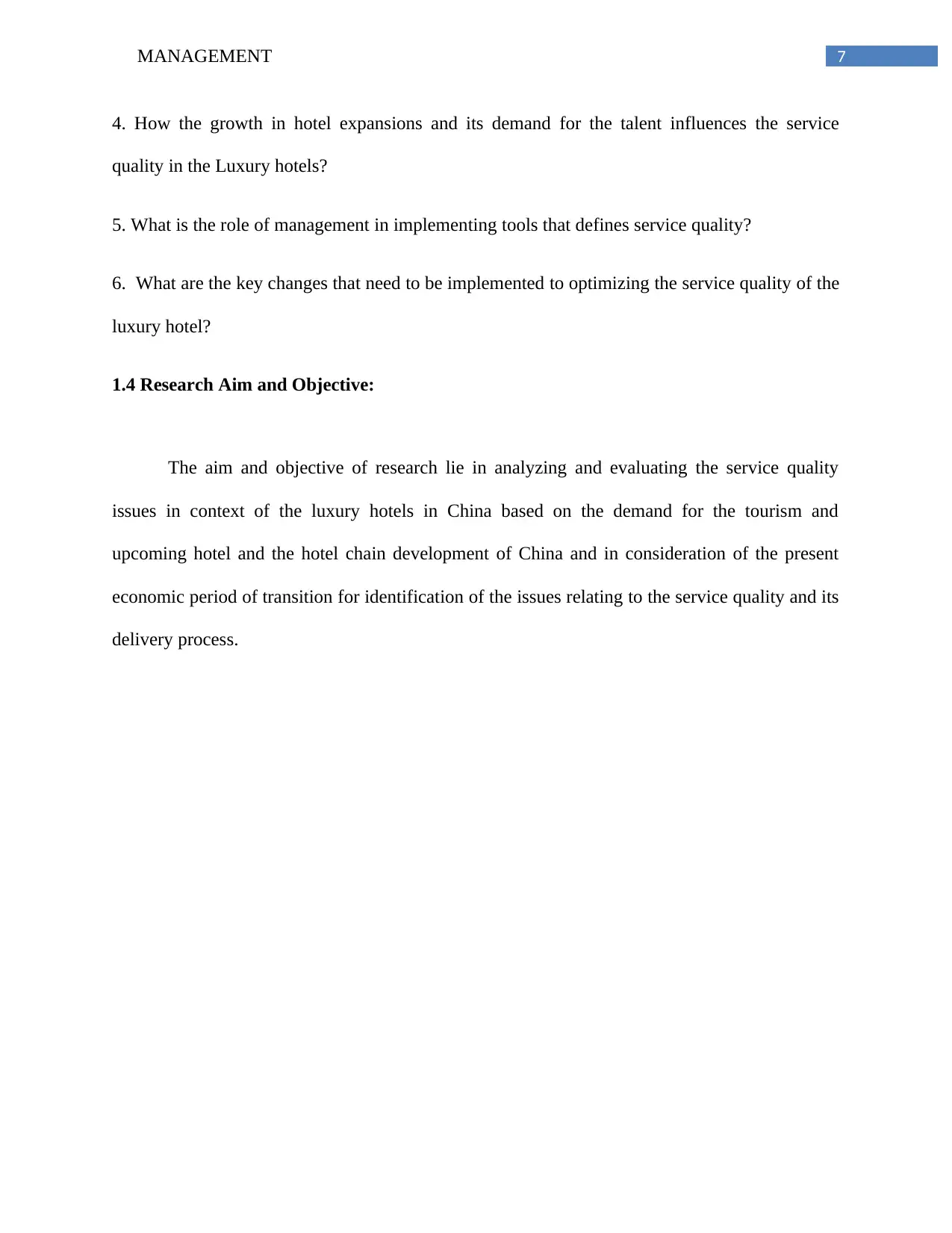
7MANAGEMENT
4. How the growth in hotel expansions and its demand for the talent influences the service
quality in the Luxury hotels?
5. What is the role of management in implementing tools that defines service quality?
6. What are the key changes that need to be implemented to optimizing the service quality of the
luxury hotel?
1.4 Research Aim and Objective:
The aim and objective of research lie in analyzing and evaluating the service quality
issues in context of the luxury hotels in China based on the demand for the tourism and
upcoming hotel and the hotel chain development of China and in consideration of the present
economic period of transition for identification of the issues relating to the service quality and its
delivery process.
4. How the growth in hotel expansions and its demand for the talent influences the service
quality in the Luxury hotels?
5. What is the role of management in implementing tools that defines service quality?
6. What are the key changes that need to be implemented to optimizing the service quality of the
luxury hotel?
1.4 Research Aim and Objective:
The aim and objective of research lie in analyzing and evaluating the service quality
issues in context of the luxury hotels in China based on the demand for the tourism and
upcoming hotel and the hotel chain development of China and in consideration of the present
economic period of transition for identification of the issues relating to the service quality and its
delivery process.
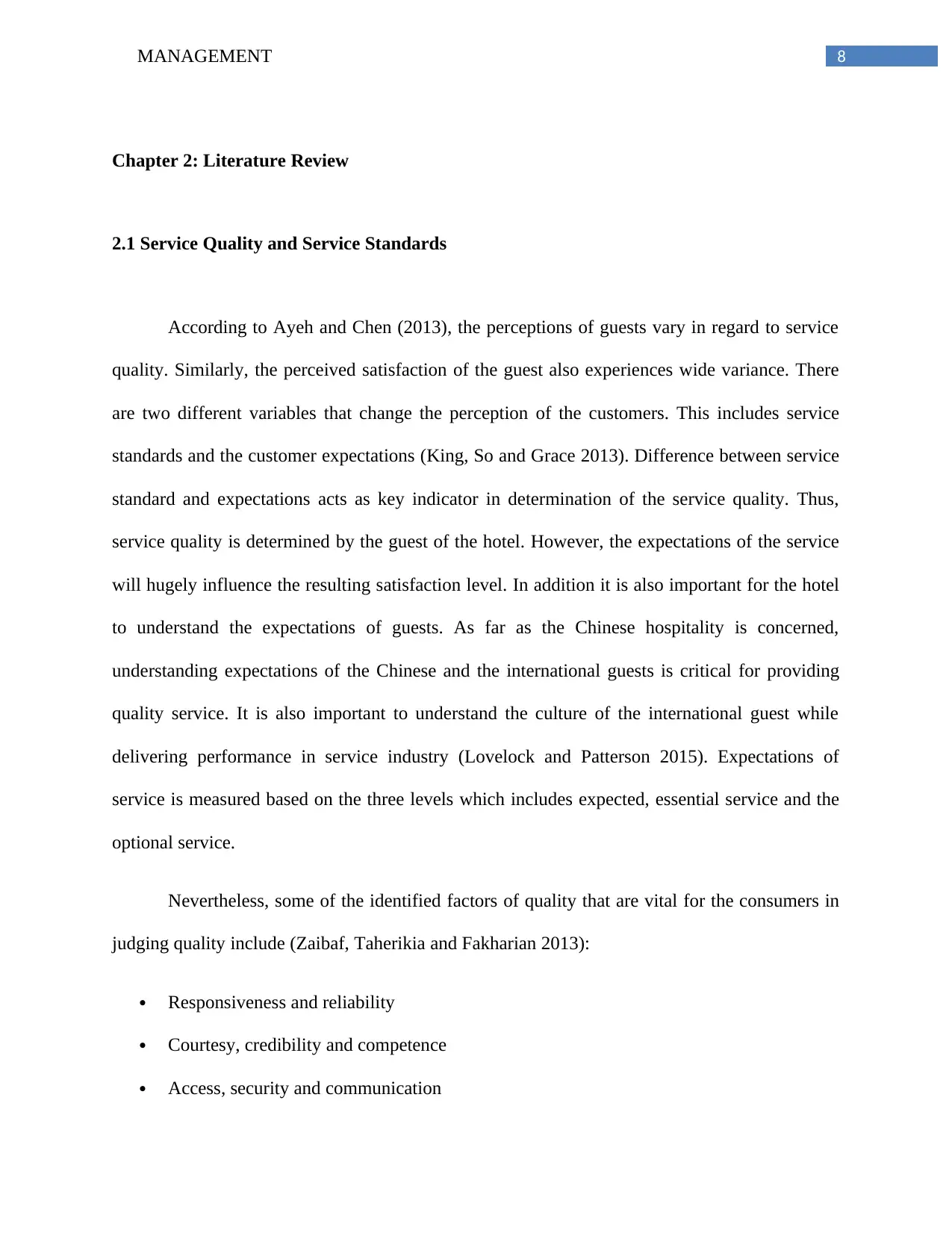
8MANAGEMENT
Chapter 2: Literature Review
2.1 Service Quality and Service Standards
According to Ayeh and Chen (2013), the perceptions of guests vary in regard to service
quality. Similarly, the perceived satisfaction of the guest also experiences wide variance. There
are two different variables that change the perception of the customers. This includes service
standards and the customer expectations (King, So and Grace 2013). Difference between service
standard and expectations acts as key indicator in determination of the service quality. Thus,
service quality is determined by the guest of the hotel. However, the expectations of the service
will hugely influence the resulting satisfaction level. In addition it is also important for the hotel
to understand the expectations of guests. As far as the Chinese hospitality is concerned,
understanding expectations of the Chinese and the international guests is critical for providing
quality service. It is also important to understand the culture of the international guest while
delivering performance in service industry (Lovelock and Patterson 2015). Expectations of
service is measured based on the three levels which includes expected, essential service and the
optional service.
Nevertheless, some of the identified factors of quality that are vital for the consumers in
judging quality include (Zaibaf, Taherikia and Fakharian 2013):
Responsiveness and reliability
Courtesy, credibility and competence
Access, security and communication
Chapter 2: Literature Review
2.1 Service Quality and Service Standards
According to Ayeh and Chen (2013), the perceptions of guests vary in regard to service
quality. Similarly, the perceived satisfaction of the guest also experiences wide variance. There
are two different variables that change the perception of the customers. This includes service
standards and the customer expectations (King, So and Grace 2013). Difference between service
standard and expectations acts as key indicator in determination of the service quality. Thus,
service quality is determined by the guest of the hotel. However, the expectations of the service
will hugely influence the resulting satisfaction level. In addition it is also important for the hotel
to understand the expectations of guests. As far as the Chinese hospitality is concerned,
understanding expectations of the Chinese and the international guests is critical for providing
quality service. It is also important to understand the culture of the international guest while
delivering performance in service industry (Lovelock and Patterson 2015). Expectations of
service is measured based on the three levels which includes expected, essential service and the
optional service.
Nevertheless, some of the identified factors of quality that are vital for the consumers in
judging quality include (Zaibaf, Taherikia and Fakharian 2013):
Responsiveness and reliability
Courtesy, credibility and competence
Access, security and communication
⊘ This is a preview!⊘
Do you want full access?
Subscribe today to unlock all pages.

Trusted by 1+ million students worldwide
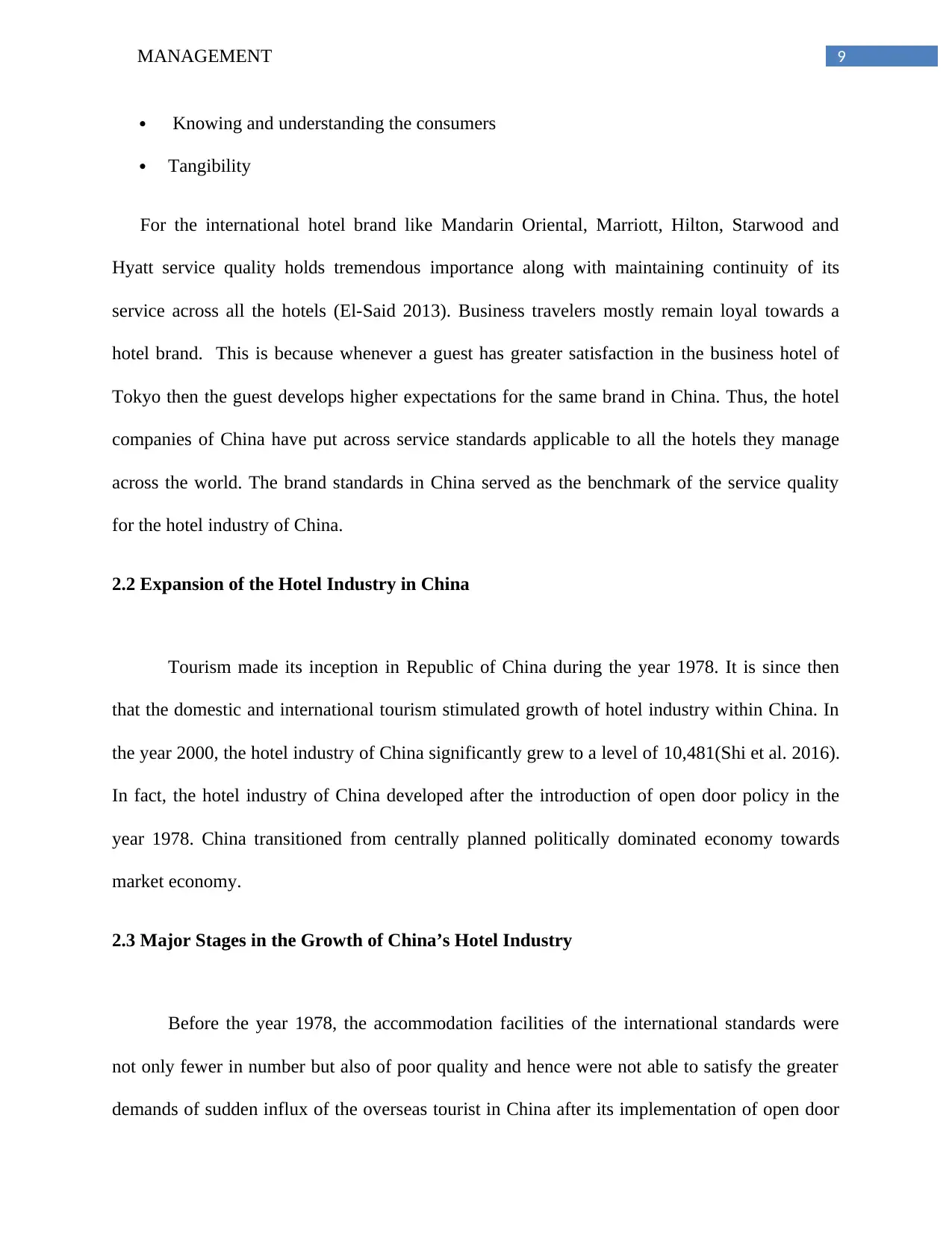
9MANAGEMENT
Knowing and understanding the consumers
Tangibility
For the international hotel brand like Mandarin Oriental, Marriott, Hilton, Starwood and
Hyatt service quality holds tremendous importance along with maintaining continuity of its
service across all the hotels (El-Said 2013). Business travelers mostly remain loyal towards a
hotel brand. This is because whenever a guest has greater satisfaction in the business hotel of
Tokyo then the guest develops higher expectations for the same brand in China. Thus, the hotel
companies of China have put across service standards applicable to all the hotels they manage
across the world. The brand standards in China served as the benchmark of the service quality
for the hotel industry of China.
2.2 Expansion of the Hotel Industry in China
Tourism made its inception in Republic of China during the year 1978. It is since then
that the domestic and international tourism stimulated growth of hotel industry within China. In
the year 2000, the hotel industry of China significantly grew to a level of 10,481(Shi et al. 2016).
In fact, the hotel industry of China developed after the introduction of open door policy in the
year 1978. China transitioned from centrally planned politically dominated economy towards
market economy.
2.3 Major Stages in the Growth of China’s Hotel Industry
Before the year 1978, the accommodation facilities of the international standards were
not only fewer in number but also of poor quality and hence were not able to satisfy the greater
demands of sudden influx of the overseas tourist in China after its implementation of open door
Knowing and understanding the consumers
Tangibility
For the international hotel brand like Mandarin Oriental, Marriott, Hilton, Starwood and
Hyatt service quality holds tremendous importance along with maintaining continuity of its
service across all the hotels (El-Said 2013). Business travelers mostly remain loyal towards a
hotel brand. This is because whenever a guest has greater satisfaction in the business hotel of
Tokyo then the guest develops higher expectations for the same brand in China. Thus, the hotel
companies of China have put across service standards applicable to all the hotels they manage
across the world. The brand standards in China served as the benchmark of the service quality
for the hotel industry of China.
2.2 Expansion of the Hotel Industry in China
Tourism made its inception in Republic of China during the year 1978. It is since then
that the domestic and international tourism stimulated growth of hotel industry within China. In
the year 2000, the hotel industry of China significantly grew to a level of 10,481(Shi et al. 2016).
In fact, the hotel industry of China developed after the introduction of open door policy in the
year 1978. China transitioned from centrally planned politically dominated economy towards
market economy.
2.3 Major Stages in the Growth of China’s Hotel Industry
Before the year 1978, the accommodation facilities of the international standards were
not only fewer in number but also of poor quality and hence were not able to satisfy the greater
demands of sudden influx of the overseas tourist in China after its implementation of open door
Paraphrase This Document
Need a fresh take? Get an instant paraphrase of this document with our AI Paraphraser
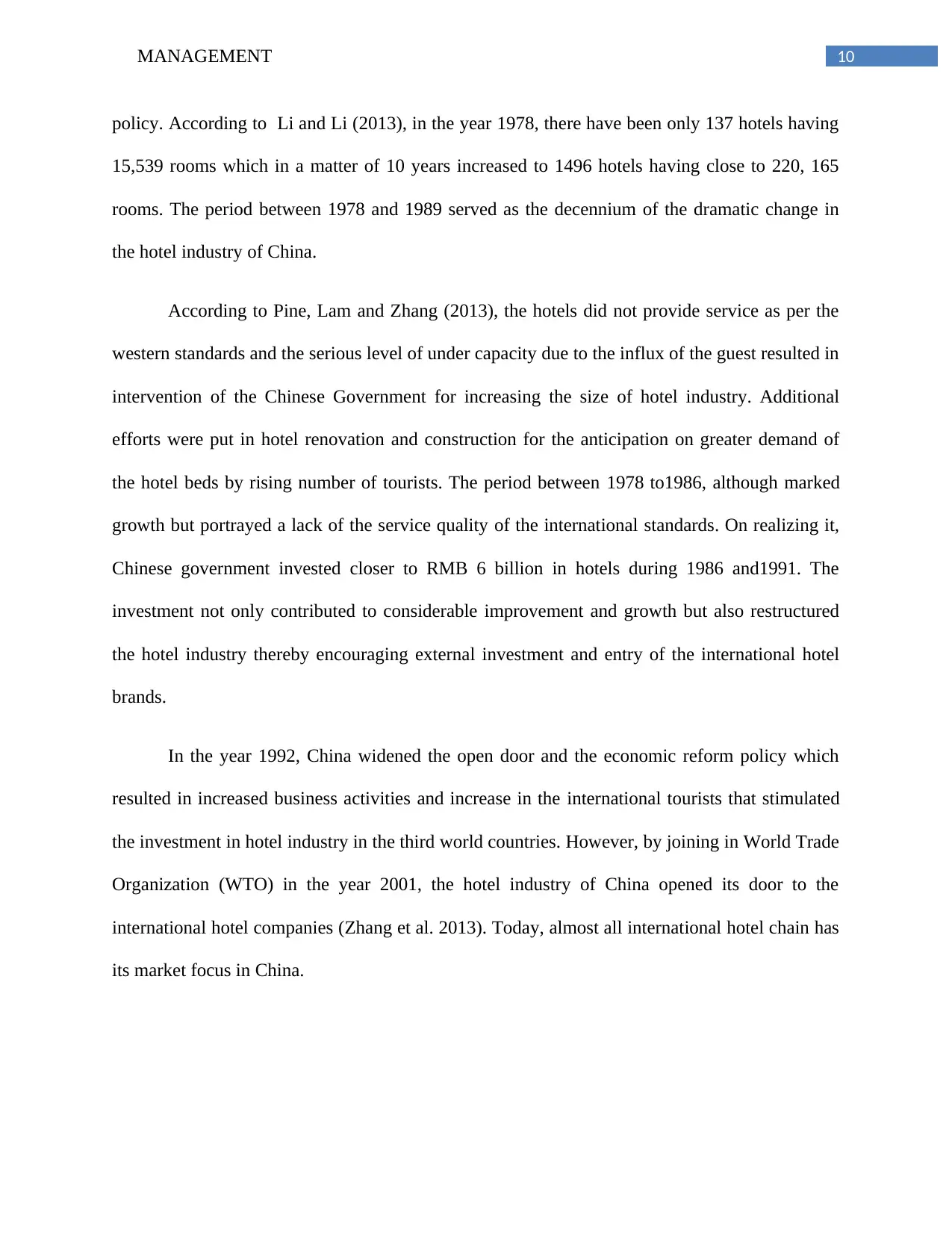
10MANAGEMENT
policy. According to Li and Li (2013), in the year 1978, there have been only 137 hotels having
15,539 rooms which in a matter of 10 years increased to 1496 hotels having close to 220, 165
rooms. The period between 1978 and 1989 served as the decennium of the dramatic change in
the hotel industry of China.
According to Pine, Lam and Zhang (2013), the hotels did not provide service as per the
western standards and the serious level of under capacity due to the influx of the guest resulted in
intervention of the Chinese Government for increasing the size of hotel industry. Additional
efforts were put in hotel renovation and construction for the anticipation on greater demand of
the hotel beds by rising number of tourists. The period between 1978 to1986, although marked
growth but portrayed a lack of the service quality of the international standards. On realizing it,
Chinese government invested closer to RMB 6 billion in hotels during 1986 and1991. The
investment not only contributed to considerable improvement and growth but also restructured
the hotel industry thereby encouraging external investment and entry of the international hotel
brands.
In the year 1992, China widened the open door and the economic reform policy which
resulted in increased business activities and increase in the international tourists that stimulated
the investment in hotel industry in the third world countries. However, by joining in World Trade
Organization (WTO) in the year 2001, the hotel industry of China opened its door to the
international hotel companies (Zhang et al. 2013). Today, almost all international hotel chain has
its market focus in China.
policy. According to Li and Li (2013), in the year 1978, there have been only 137 hotels having
15,539 rooms which in a matter of 10 years increased to 1496 hotels having close to 220, 165
rooms. The period between 1978 and 1989 served as the decennium of the dramatic change in
the hotel industry of China.
According to Pine, Lam and Zhang (2013), the hotels did not provide service as per the
western standards and the serious level of under capacity due to the influx of the guest resulted in
intervention of the Chinese Government for increasing the size of hotel industry. Additional
efforts were put in hotel renovation and construction for the anticipation on greater demand of
the hotel beds by rising number of tourists. The period between 1978 to1986, although marked
growth but portrayed a lack of the service quality of the international standards. On realizing it,
Chinese government invested closer to RMB 6 billion in hotels during 1986 and1991. The
investment not only contributed to considerable improvement and growth but also restructured
the hotel industry thereby encouraging external investment and entry of the international hotel
brands.
In the year 1992, China widened the open door and the economic reform policy which
resulted in increased business activities and increase in the international tourists that stimulated
the investment in hotel industry in the third world countries. However, by joining in World Trade
Organization (WTO) in the year 2001, the hotel industry of China opened its door to the
international hotel companies (Zhang et al. 2013). Today, almost all international hotel chain has
its market focus in China.
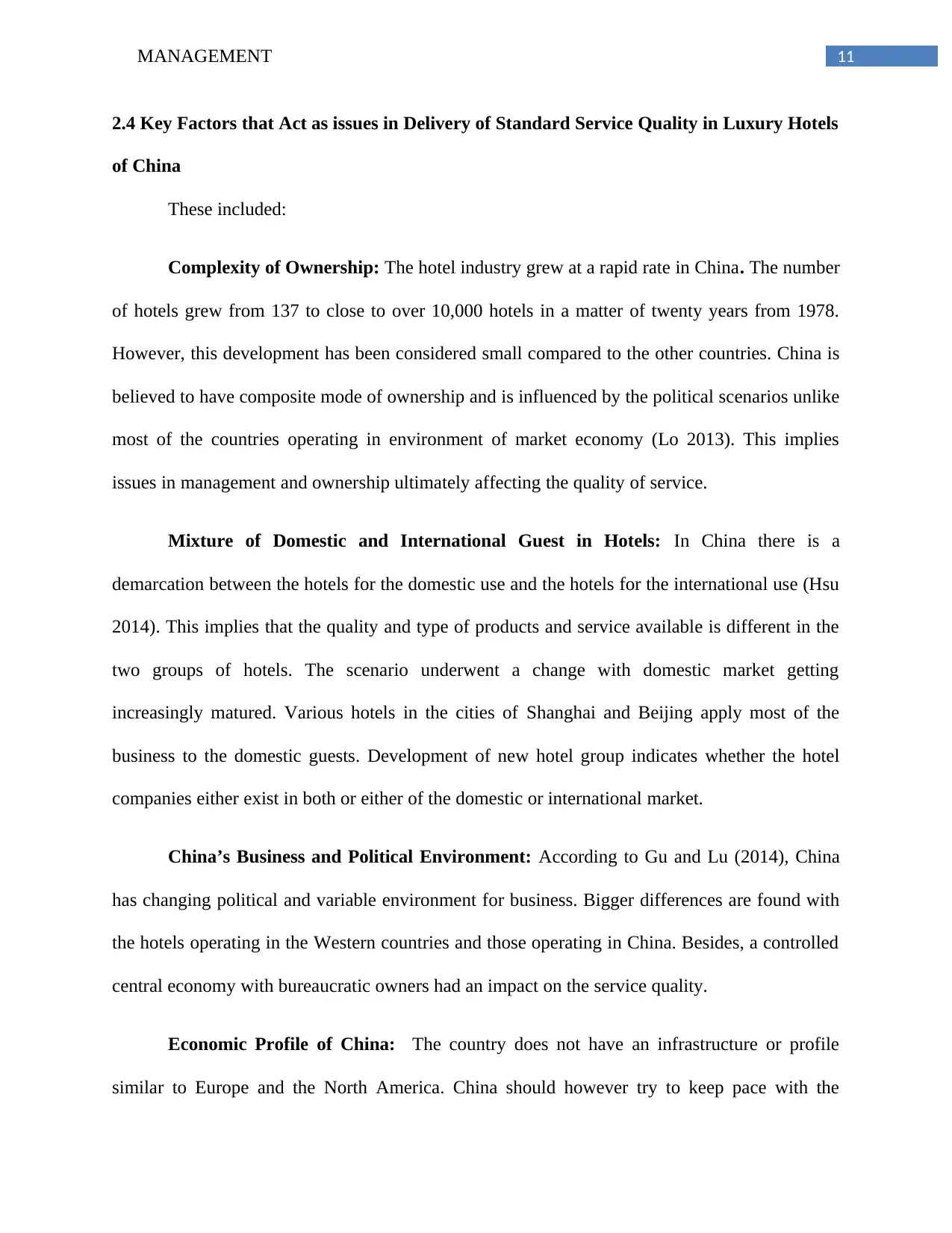
11MANAGEMENT
2.4 Key Factors that Act as issues in Delivery of Standard Service Quality in Luxury Hotels
of China
These included:
Complexity of Ownership: The hotel industry grew at a rapid rate in China. The number
of hotels grew from 137 to close to over 10,000 hotels in a matter of twenty years from 1978.
However, this development has been considered small compared to the other countries. China is
believed to have composite mode of ownership and is influenced by the political scenarios unlike
most of the countries operating in environment of market economy (Lo 2013). This implies
issues in management and ownership ultimately affecting the quality of service.
Mixture of Domestic and International Guest in Hotels: In China there is a
demarcation between the hotels for the domestic use and the hotels for the international use (Hsu
2014). This implies that the quality and type of products and service available is different in the
two groups of hotels. The scenario underwent a change with domestic market getting
increasingly matured. Various hotels in the cities of Shanghai and Beijing apply most of the
business to the domestic guests. Development of new hotel group indicates whether the hotel
companies either exist in both or either of the domestic or international market.
China’s Business and Political Environment: According to Gu and Lu (2014), China
has changing political and variable environment for business. Bigger differences are found with
the hotels operating in the Western countries and those operating in China. Besides, a controlled
central economy with bureaucratic owners had an impact on the service quality.
Economic Profile of China: The country does not have an infrastructure or profile
similar to Europe and the North America. China should however try to keep pace with the
2.4 Key Factors that Act as issues in Delivery of Standard Service Quality in Luxury Hotels
of China
These included:
Complexity of Ownership: The hotel industry grew at a rapid rate in China. The number
of hotels grew from 137 to close to over 10,000 hotels in a matter of twenty years from 1978.
However, this development has been considered small compared to the other countries. China is
believed to have composite mode of ownership and is influenced by the political scenarios unlike
most of the countries operating in environment of market economy (Lo 2013). This implies
issues in management and ownership ultimately affecting the quality of service.
Mixture of Domestic and International Guest in Hotels: In China there is a
demarcation between the hotels for the domestic use and the hotels for the international use (Hsu
2014). This implies that the quality and type of products and service available is different in the
two groups of hotels. The scenario underwent a change with domestic market getting
increasingly matured. Various hotels in the cities of Shanghai and Beijing apply most of the
business to the domestic guests. Development of new hotel group indicates whether the hotel
companies either exist in both or either of the domestic or international market.
China’s Business and Political Environment: According to Gu and Lu (2014), China
has changing political and variable environment for business. Bigger differences are found with
the hotels operating in the Western countries and those operating in China. Besides, a controlled
central economy with bureaucratic owners had an impact on the service quality.
Economic Profile of China: The country does not have an infrastructure or profile
similar to Europe and the North America. China should however try to keep pace with the
⊘ This is a preview!⊘
Do you want full access?
Subscribe today to unlock all pages.

Trusted by 1+ million students worldwide
1 out of 25
Related Documents
Your All-in-One AI-Powered Toolkit for Academic Success.
+13062052269
info@desklib.com
Available 24*7 on WhatsApp / Email
![[object Object]](/_next/static/media/star-bottom.7253800d.svg)
Unlock your academic potential
Copyright © 2020–2026 A2Z Services. All Rights Reserved. Developed and managed by ZUCOL.




